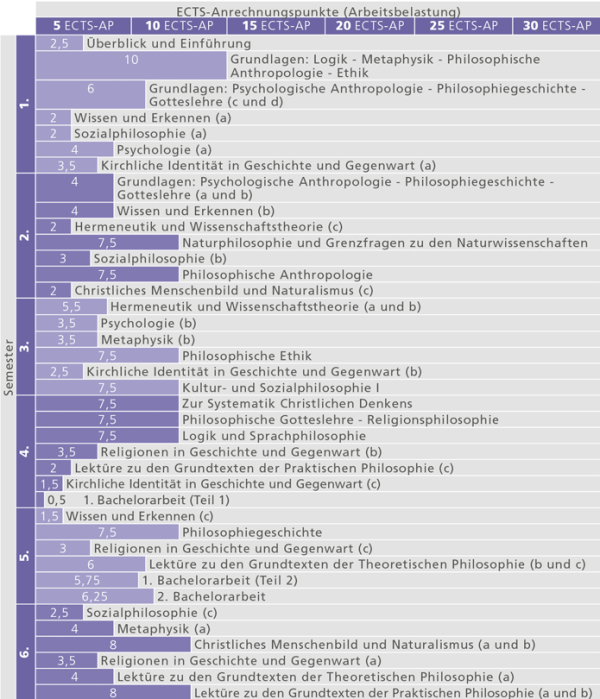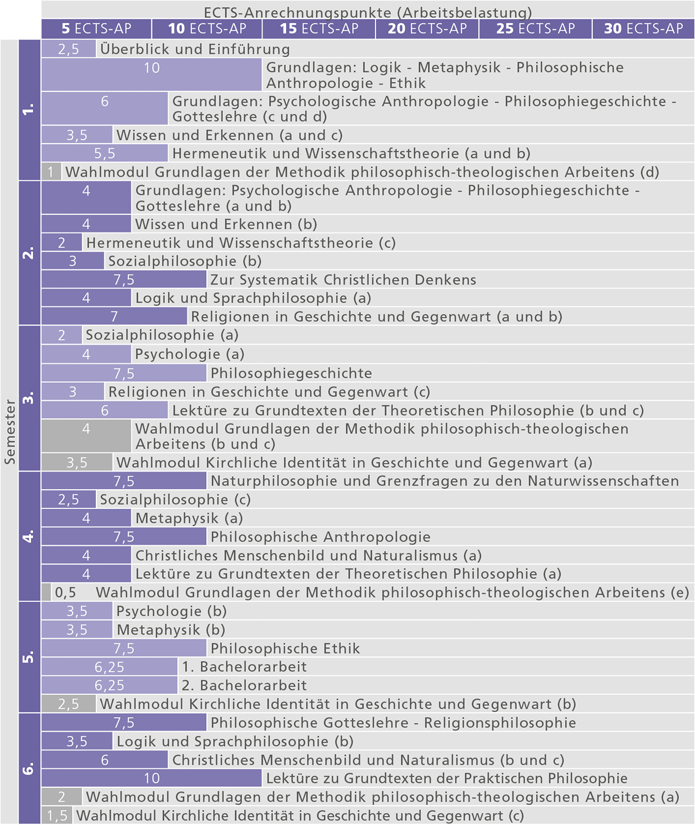Bachelorstudium Philosophie an der Katholisch-Theologischen Fakultät
Curriculum (2009W)
Ab dem Wintersemester 2021/2022 darf eine Zulassung zu diesem Studium nur nach dem neuen Curriculum erfolgen.
Bachelor der Philosophie (B.phil.)
Dauer/ECTS-AP
6 Semester/180 ECTS-AP
Studienart
Vollzeit
Unterrichtssprache
Deutsch
Voraussetzung
Matura/Äquivalentes Zeugnis und Sprachnachweis
Fakultät
Katholisch-Theologische Fakultät
Niveau der Qualifikation
Bachelor (1. Studienzyklus)
ISCED-11: Stufe 6, EQR/NQR: Stufe 6
ISCED-F
0223 Philosophie und Ethik
Studienkennzahl
UC 033 194
Zusatzprüfung
Die Zusatzprüfung aus Latein ist bis zur vollständigen Ablegung des Bachelorstudiums nachzuweisen, wenn dieses Fach nicht an einer höheren Schule im Ausmaß von mindestens 10 Wochenstunden erfolgreich absolviert wurde. Beachten Sie, dass diese Zusatzprüfung nicht die letzte Prüfung des Studiums sein darf.
* Informationen zum Curriculum
Die Gesamtfassung des Curriculums spiegelt das aktuell gültige Curriculum wider, ist rechtlich unverbindlich und dient lediglich der Information. Die rechtlich verbindliche Form des Curriculums inkl. etwaiger Änderungen finden Sie in den entsprechenden Mitteilungsblättern.
Die Information, welche Curriculumsversion für Sie gilt, entnehmen Sie bitte Ihrem Studienblatt
abrufbar unter: https://lfuonline.uibk.ac.at/public/lfuonline_meinestudien.studienblatt
Spalte: Curriculum in der geltenden Fassung
- Curriculum/Gesamtfassung (ab 01.10.2016)
- Mitteilungsblatt vom 31.03.2016, 17. Stück, Nr. 303 (Änderung des Curriculums)
- Curriculum/Gesamtfassung (ab 01.10.2015)
- Mitteilungsblatt vom 19.08.2015, 81. Stück, Nr. 575 (Äquivalenzliste)
- Mitteilungsblatt vom 07.05.2015, 35. Stück, Nr. 397 (Änderung des Curriculums)
- Curriculum/Gesamtfassung (ab 01.10.2014)
- Mitteilungsblatt vom 13.06.2014, 27. Stück, Nr. 478 (Änderung des Curriculums)
- Curriculum/Gesamtfassung (ab 01.10.2011)
- Mitteilungsblatt vom 08.06.2011, 26. Stück, Nr. 433 (Änderung des Curriculums)
- Mitteilungsblatt vom 13.02.2009, 22. Stück, Nr. 128
Studieneingangs- und Orientierungsphase
(1) Die Studieneingangs- und Orientierungsphase erstreckt sich über ein Semester und hat der oder dem Studierenden einen Überblick über die wesentlichen Inhalte des jeweiligen Studiums und dessen weiteren Verlauf zu vermitteln und eine sachliche Entscheidungsgrundlage für die persönliche Beurteilung ihrer oder seiner Studienwahl zu schaffen.
(2) Im Rahmen der Studieneingangs- und Orientierungsphase sind folgende Lehrveranstaltungsprüfungen, die zweimal wiederholt werden dürfen, abzulegen:
1. SL Einführung in das wissenschaftliche Arbeiten (PM 1 lit. b, 1 SST, 2 ECTS-AP)
2. VO Logik (PM 2 lit. c, 2 SST, 4 ECTS-AP)
(3) Der positive Erfolg bei den in Abs. 2 genannten Prüfungen berechtigt zur Absolvierung aller weiteren, über die Studieneingangs- und Orientierungsphase hinausgehenden Lehrveranstaltungen und Prüfungen sowie zum Verfassen der im Curriculum vorgesehenen Bachelorarbeiten. Im Curriculum festgelegte Anmeldungsvoraussetzungen sind einzuhalten.
2,5 ECTS-AP: Überblick und Einführung
10,0 ECTS-AP: Grundlagen: Logik - Metaphysik - Philosophische Anthropologie - Ethik
6,0 ECTS-AP: Grundlagen: Psychologische Anthropologie - Philosophiegeschichte - Gotteslehre (c und d)
2,0 ECTS-AP: Wissen und Erkennen (a)
2,0 ECTS-AP: Sozialphilosophie (a)
4,0 ECTS-AP: Psychologie (a)
3,5 ECTS-AP: Kirchliche Identität in Geschichte und Gegenwart (a)
4,0 ECTS-AP: Grundlagen: Psychologische Anthropologie - Philosophiegeschichte - Gotteslehre (a und b)
4,0 ECTS-AP: Wissen und Erkennen (b)
2,0 ECTS-AP: Hermeneutik und Wissenschaftstheorie (c)
7,5 ECTS-AP: Naturphilosophie und Grenzfragen zu den Naturwissenschaften
3,0 ECTS-AP: Sozialphilosophie (b)
7,5 ECTS-AP: Philosophische Anthropologie
2,0 ECTS-AP: Christliches Menschenbild und Naturalismus (c)
5,5 ECTS-AP: Hermeneutik und Wissenschaftstheorie (a und b)
3,5 ECTS-AP: Psychologie (b)
3,5 ECTS-AP: Metaphysik (b)
7,5 ECTS-AP: Philosophische Ethik
2,5 ECTS-AP: Kirchliche Identität in Geschichte und Gegenwart (b)
7,5 ECTS-AP: Kultur- und Sozialphilosophie I
7,5 ECTS-AP: Zur Systematik Christlichen Denkens
7,5 ECTS-AP: Philosophische Gotteslehre - Religionsphilosophie
7,5 ECTS-AP: Logik und Sprachphilosophie
3,5 ECTS-AP: Religionen in Geschichte und Gegenwart (b)
2,0 ECTS-AP: Lektüre zu den Grundtexten der Praktischen Philosophie (c)
1,5 ECTS-AP: Kirchliche Identität in Geschichte und Gegenwart (c)
0,5 ECTS-AP: 1. Bachelorarbeit (Teil 1)
1,5 ECTS-AP: Wissen und Erkennen (c)
7,5 ECTS-AP: Philosophiegeschichte
3,0 ECTS-AP: Religionen in Geschichte und Gegenwart (c)
6,0 ECTS-AP: Lektüre zu den Grundtexten der Theoretischen Philosophie (b und c)
5,75 ECTS-AP: 1. Bachelorarbeit (Teil 2)
6,25 ECTS-AP: 2. Bachelorarbeit
2,5 ECTS-AP: Sozialphilosophie (c)
4,0 ECTS-AP: Metaphysik (a)
8,0 ECTS-AP: Christliches Menschenbild und Naturalismus (a und b)
3,5 ECTS-AP: Religionen in Geschichte und Gegenwart (a)
4,0 ECTS-AP: Lektüre zu den Grundtexten der Theoretischen Philosophie (a)
8,0 ECTS-AP: Lektüre zu den Grundtexten der Praktischen Philosophie (a und b)
Es sind Wahlmodule im Ausmaß von insgesamt 15 ECTS-AP zu absolvieren: Entweder die Wahlmodule 1, 2 und 3 (à 5 ECTS-AP) oder zwei der Wahlmodule 4 bis 11 (à 7,5 ECTS-AP). Die Aufteilung der Wahlmodule im Studienverlaufsplan ist beispielhaft zu verstehen.

2,5 ECTS-AP: Überblick und Einführung
10,0 ECTS-AP: Grundlagen: Logik - Metaphysik - Philosophische Anthropologie - Ethik
6,0 ECTS-AP: Grundlagen: Psychologische Anthropologie - Philosophiegeschichte - Gotteslehre (c und d)
3,5 ECTS-AP: Wissen und Erkennen (a und c)
5,5 ECTS-AP: Hermeneutik und Wissenschaftstheorie (a und b)
(1,0 ECTS-AP: Wahlmodul Grundlagen der Methodik philosophisch-theologischen Arbeitens [d])
4,0 ECTS-AP: Grundlagen: Psychologische Anthropologie - Philosophiegeschichte - Gotteslehre (a und b)
4,0 ECTS-AP: Wissen und Erkennen (b)
2,0 ECTS-AP: Hermeneutik und Wissenschaftstheorie (c)
3,0 ECTS-AP: Sozialphilosophie (b)
7,5 ECTS-AP: Zur Systematik Christlichen Denkens
4,0 ECTS-AP: Logik und Sprachphilosophie (a)
7,0 ECTS-AP: Religionen in Geschichte und Gegenwart (a und b)
2,0 ECTS-AP: Sozialphilosophie (a)
4,0 ECTS-AP: Psychologie (a)
7,5 ECTS-AP: Philosophiegeschichte
3,0 ECTS-AP: Religionen in Geschichte und Gegenwart (c)
6,0 ECTS-AP: Lektüre zu Grundtexten der Theoretischen Philosophie (b und c)
(4,0 ECTS-AP: Wahlmodul Grundlagen der Methodik philosophisch-theologischen Arbeitens [b und c])
(3,5 ECTS-AP: Wahlmodul Kirchliche Identität in Geschichte und Gegenwart [a])
7,5 ECTS-AP: Naturphilosophie und Grenzfragen zu den Naturwissenschaften
2,5 ECTS-AP: Sozialphilosophie (c)
4,0 ECTS-AP: Metaphysik (a)
7,5 ECTS-AP: Philosophische Anthropologie
4,0 ECTS-AP: Christliches Menschenbild und Naturalismus (a)
4,0 ECTS-AP: Lektüre zu Grundtexten der Theoretischen Philosophie (a)
(0,5 ECTS-AP: Wahlmodul Grundlagen der Methodik philosophisch-theologischen Arbeitens [e])
3,5 ECTS-AP: Psychologie (b)
3,5 ECTS-AP: Methaphysik (b)
7,5 ECTS-AP: Philosophische Ethik
6,25 ECTS-AP: 1. Bachelorarbeit
6,25 ECTS-AP: 2. Bachelorarbeit
(2,5 ECTS-AP: Wahlmodul Kirchliche Identität in Geschichte und Gegenwart [b])
7,5 ECTS-AP: Philosophische Gotteslehre - Religionsphilosophie
3,5 ECTS-AP: Logik und Sprachphilosophie (b)
6,0 ECTS-AP: Christliches Menschenbild und Naturalismus (b und c)
10,0 ECTS-AP: Lektüre zu Grundtexten der Praktischen Philosophie
(2,0 ECTS-AP: Wahlmodul Grundlagen der Methodik philosophisch-theologischen Arbeitens [a])
(1,5 ECTS-AP: Wahlmodul Kirchliche Identität in Geschichte und Gegenwart [c])
Es sind Wahlmodule im Ausmaß von insgesamt 15 ECTS-AP zu absolvieren: Entweder die Wahlmodule 1, 2 und 3 (à 5 ECTS-AP) oder zwei der Wahlmodule 4 bis 11 (à 7,5 ECTS-AP). Die Aufteilung der Wahlmodule im Studienplan ist beispielhaft zu verstehen.

Je nach Einstiegsjahr kann sich der empfohlene Studienverlauf in einzelnen Punkten unterscheiden. Weitere Informationen dazu finden Sie auf der Homepage der Katholisch-Theologischen Fakultät.
Erweiterung des Studiums
Im Rahmen dieses Studiums kann das Erweiterungsstudium Informatik im Umfang von 60 ECTS-AP absolviert werden. Die Zulassung zur Erweiterung setzt die Zulassung zu einem oder den bereits erfolgten Abschluss eines ausgewählten Studiums voraus. Weitere Informationen sind abrufbar unter:
Informationen zur Prüfungsordnung inkl. Bewertung und Benotung
Prüfungsordnung
Die Prüfungsordnung ist integraler Bestandteil des Curriculums, detaillierte Informationen finden Sie unter dem Paragrafen Prüfungsordnung.
Bei der Notenverteilungsskala handelt es sich um die statistische Darstellung der Verteilung aller positiv absolvierten Prüfungen, die innerhalb eines Studiums bzw. eines Studienfaches (unter Heranziehung aller gemeldeten Studierenden eines Studiums bzw. eines Studienfaches) erfasst wurden. Die Notenverteilungsskala wird in regelmäßigen Abständen aktualisiert.
| A | B | C | D | E |
|---|---|---|---|---|
| Österreichische Notenskala | Definition | %-Satz | ||
| 1 | SEHR GUT: Hervorragende Leistung | 56 | = 100% | |
| 2 | GUT: Generell gut, einige Fehler | 26,6 | ||
| 3 | BEFRIEDIGEND: Ausgewogen, Zahl entscheidender Fehler | 12,8 | ||
| 4 | GENÜGEND: Leistung entspricht den Minimalkriterien | 4,6 | ||
| 5 | NICHT GENÜGEND: Erhebliche Verbesserungen erforderlich, Erfordernis weiterer Arbeit |
Dezember 2021
Gesamtbeurteilung der Qualifikation
Nicht zutreffend
Erklärung: Eine Gesamtbeurteilung (mit Auszeichnung bestanden, bestanden, nicht bestanden) wird nur über eine studienabschließende Prüfung, die aus mehr als einem Fach besteht, vergeben (im Curriculum dieses Studiums ist diese nicht vorgesehen).
Formulare
- Nachweis über die Bachelorarbeit gemäß Curriculum
- Prüfungsprotokoll
- Ansuchen um Anerkennung von PrüfungenUNDBeiblatt
ACHTUNG: Füllen Sie bitte das Formular "Ansuchen um Anerkennung von Prüfungen" UND das "Beiblatt Philosophie an der Katholisch-Theologischen Fakultät" aus! - Antrag um Zulassung zur dritten und vierten Wiederholung einer Lehrveranstaltungsprüfung
Kontakt und Information
Prüfungsreferat
Standort Universitsstraße 15
Studienbeauftragter
Dr. Daniel Wehinger
Studiendekan
Priv.-Doz. Dr. Liborius Olaf Lumma
